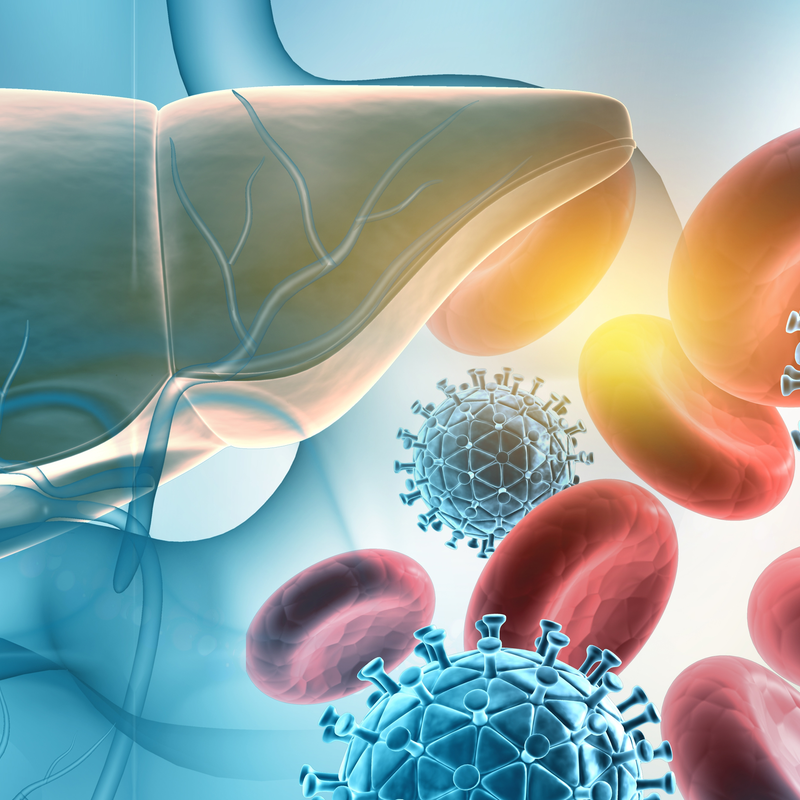
What is hepatitis type A - HAV virus?
Hepatitis A is an inflammation of the liver caused by viruses. The hepatitis type A virus can be found worldwide, but is much rarer in countries with a high standard of hygiene. Almost 50 % of all people infected in Germany contracted the virus during a stay abroad. This is why it is often referred to as travel hepatitis.
How is hepatitis type A - HAV virus transmitted?
The transmission route of hepatitis A viruses is from person to person via the faecal-oral route. Most commonly, hepatitis A virus is transmitted through the consumption of contaminated food, such as vegetables and salads, that have been fertilised with faeces. Mussels, oysters and seafood are also common carriers of the virus. But the virus can also be passed on due to inadequate hygiene measures in the kitchen, for example if hands are not washed properly. Contaminated bathing water and drinking water are also a source of infection.
Person-to-person transmission occurs in close contact, such as in shared households or in kindergartens. In this case, the hepatitis A viruses are brought into circulation through smear infections .
However, infection is also possible through sexual contact , for example through oral-anal practice. The virus can also be transmitted through blood and blood products.
When does the hepatitis type A - HAV virus break out and how long is one contagious?
The incubation period is between 15 and 50 days. On average, it is about 4 weeks. You are most contagious about two weeks before and one week after symptoms appear. Infants, however, can excrete the virus in their stool for a much longer period of time than adults.
Especially in children, the infection with the virus runs with no or mild symptoms. Adults usually become more seriously ill in . The first signs of illness are:
- Nausea,
- Vomiting,
- Diarrhoea,
- Abdominal pain,
- elevated temperature,
- Jaundice with yellowing of the skin and conjunctiva,
- dark urine, discoloured stools, itching of the skin.
As a rule, these symptoms persist for several days to several weeks
.
It can take up to another two to four weeks for a patient to recover completely. In about every tenth
person affected, hepatitis A also lasts longer. After a few months
the viral infection mostly heals again without complications.
Only in very few cases does it become life-threatening. If the patient has survived
hepatitis A, he has lifelong protection.
How is hepatitis type A - HAV virus diagnosed?
The diagnosis is made with the help of antibody detection in the laboratory.
How is hepatitis type A - HAV virus treated?
There is no specific treatment against hepatitis A. Apart from bed rest , symptomatic therapy is the main treatment. Alcohol abstinence is essential and greasy foods should be avoided during the period of illness. For most patients, it is not necessary for them to go to hospital as long as they can be adequately cared for at home .
Who is particularly at risk from the hepatitis type A - HAV virus?
Anyone who has not yet been through the illness or has not been fully vaccinated against hepatitis A can fall ill. But especially at risk are:
- Holidaymakers and travellers in countries and regions where the virus is widespread,
- People who have close contact with an infected person,
- The risk of a severe course of the disease is significantly increased in certain pre-existing conditions and in older people.
What must be taken into account when contracting hepatitis type A - HAV virus?
Those affected by hepatitis type A - HAV virus should be aware of the following:
- There is no specific therapy; only complaints can be alleviated.
- Physical exertion should always be avoided in the acute phase of the disease.
- In the initial phase of the disease, a low-fat and carbohydrate-rich diet should be followed.
- Alcohol should be avoided completely.
- Do not take any medicines that could affect the liver without consulting a doctor.
- Observe hygiene measures , such as washing your hands after going to the toilet, and before preparing food . After washing hands, disposable paper towels or your own towel should be used.
- If possible, a separate toilet should be used.
For
hepatitis A, the current regulations of the
Infection Protection Act apply. This means that people infected or suspected of being infected with hepatitis A
are not allowed to visit
schools, kindergartens or other community facilities
or work there. The attending doctor or the responsible
health authority must decide when the
community institution may be visited again. Anyone who works professionally with
food may not work if hepatitis A is suspected or
if the disease is present.
How can infection with hepatitis type A - HAV virus be prevented?
You can be vaccinated against hepatitis A, which is recommended by the Stiko for the following persons at risk:
- Homosexuals, as they have an increased risk of infection.
- People who suffer from liver diseases.
- Persons who frequently receive blood transfusions.
- Drug users who inject themselves,
- Travellers to regions where the virus is widespread.
Anyone who has had contact with a hepatitis A patient
and is not yet protected
should be vaccinated within 14 days. For people who are particularly
at risk, additional immunoglobulins can be given.
